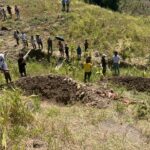Conversation with Shobha Tiwari: A champion of tribal land rights
Authors: Anushree Mitra (MetaMeta Research), Meghna Mukherjee (MetaMeta Research), Poulomi Mallick (PRADAN)
Meet Shobha Tiwari. Though she hails from Chattisgarh state in India, she has lived and worked in Samnapur Block, Dindori district of Madhya Pradesh (MP), for most of her life. After her post-graduation, she was preparing for her Master’s in Philosophy when she joined Ekta Parishad[1] (an organization that fights for land rights in India) in 1999. During that time, there was a march organized from Chambal to Raigarh in MP to protest against land rights. She was a part of that for 15 days. During that time, she visited Dindori, a Baiga[2] (the Baiga is an ethnic group found in central India, primarily in Madhya Pradesh) dominated area.
During her interaction with the Baiga community, Shobha realized the extent of dependence the community had on the forest produce. Though the community had access to most of the forest resources, they still lacked other resources to sustain their lives. Grains, for example, were such a commodity. Additionally, they did not have access to education or credit, which made their lives difficult.
When she saw all of this, she realized that working with them is crucial so they can be empowered without losing their culture, knowledge, and traditions. Traditions and indigenous knowledge form an integral part of the Baiga Community. “But traditions will stay alive only when their stomach is full. Even if they migrate, they cannot adjust because their lives are always forest centric. They were nomads. They had no clothes, house, education, or grains. Forest was their only resource,” said Shobha Tiwari. She added that the problems were exacerbated when the central Government implemented rules and regulations to access the forest and its produce. The Forest Department was the sole authority on all matters related to forests. The shift in power to the formal government authorities adversely impacted the Baiga community. Seeing the challenges faced by the people, Shobha Tiwari decided to leave her home and education and dedicate her life to working for the rights of the Baiga community.
[2] Baiga tribe. (2022, October 28). In Wikipedia.
Challenges and Struggles:
The most critical challenge was to provide them with the right to own their traditional lands. Since the Baiga community has traditionally been forest dwellers and nomads, they did not ever feel the need to own the land. However, as new rules and regulations started restricting access to land, they felt the need to officially own the land. Shobha adds, “If they get the right to the lands, they will be able to grow their crops. Two important things will happen if the Biagas start growing their produce. One is that they will stop with their nomadic life and settle in one place, and the second is that their debts with the moneylenders will stop.” Struggles over land rights took a lot of time. There was much back and forth between the community and the forest department. The authorities levied fees, fines, and punishments to discourage people from clearing the forests for farming activities. However, the people did not give in, and nothing could deter their spirits. In 2007 when a land rights movement was taking place in the country, Shobha Tiwari and the community saw it as the perfect opportunity to make their voices heard.
Remembering the struggle, she says, “We wanted the rights to the land we are farming on. We wanted our land documents. The Government stated that the forest lands were theirs, but these lands have always belonged to the Baigas. To get what is ours, 4000-5000 people went to Delhi from Dindori to demand their rights from the Government. After a long struggle, finally, in 2008, people started getting their documents.”
A relieved Shobha Tiwari says that it makes her immensely happy to see that today people have their land documents- they can farm on their land and eat what they grow. Some people can produce 40-50 quintals of rice, while there was one time when people did not even have 1 kg of rice to sustain their lives.
The seeds of change
As people started becoming more food secure, they were able to improve their lives on other fronts. Education was the next important thing; the children were sent to school to receive formal education. It was seen that “If the children have awareness, the parents have awareness.”
Another significant milestone was to start working with women. The approach was not to work only in finance but to empower them holistically. This led to the creation of the Mutual Help Group. The group would save money and take loans and voice their opinion against societal and social injustices. They would fight for their rights. Shobha Tiwari proudly says, “Today, a lot of women have become very active, and a lot of organizations have started working with these women only. The journey from bringing the women from the kitchen to the roads was long and full of struggles. A journey for the women to express their opinions.” Now, elected women officials have the autonomy to make their own decisions and have space to work freely without the fear of their husbands taking their place.
The community and the people are now more vocal about their demands and do not hesitate to ask the Government for their rights. They demanded water supply, fertilizers, and seeds from the Government since most of the land they received were not fertile. The Government was able to comply with the demands. Shobha Tiwari says, “The Government and the politicians have never directly opposed us. They were not sympathetic to our cause but never went against us. The Forest Department never sympathized with us because we were fighting against them. Maybe the department wasn’t in favor of us but the members working there were always supportive because they knew they also came out of these areas. They know what the situations and conditions of these areas are.”
Way forward:
Looking back at her struggles, Shobha Tiwari says that though life was difficult and everything felt impossible, the community’s love and trust kept her going. After 20 years of work, she is proud and relieved to see that the tribal communities can do farming and are self-sustainable. They can produce enough to sustain their family. They have schools and hospitals and are slowly reaching a good quality of life.


